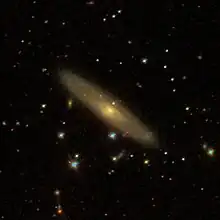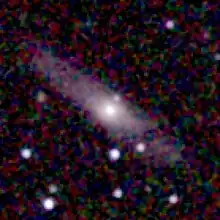| NGC 13 | |
|---|---|
 SDSS image of NGC 13 | |
| Observation data (J2000 epoch) | |
| Constellation | Andromeda |
| Right ascension | 00h 08m 47.72s[1] |
| Declination | +33° 26′ 00.0″[1] |
| Redshift | 0.01604[1] |
| Heliocentric radial velocity | 4808 ± 9 km/s[1] |
| Distance | 215.8 ± 15.1 Mly (66.15 ± 4.64 Mpc)[1] |
| Apparent magnitude (B) | 14.20[2] |
| Absolute magnitude (V) | −19.76[2] |
| Characteristics | |
| Type | (R)Sab:[1] |
| Apparent size (V) | 2.2′ × 0.4′[3] |
| Other designations | |
| UGC 77, MCG +05-01-034, PGC 650[4] | |
NGC 13 is a spiral galaxy[1] in the constellation Andromeda. It is estimated to be about 220 million light-years (66 Megaparsecs) away from the Sun.[1] It was discovered on November 26, 1790, by William Herschel.[3]

NGC 13 (near-infrared)
References
- 1 2 3 4 5 6 7 8 "Results for object NGC 0013 (NGC 13)". NASA/IPAC Extragalactic Database. California Institute of Technology. Retrieved 2021-02-02.
- 1 2 "The galaxy NGC 13".
- 1 2 Seligman, Courtney. "New General Catalogue objects: NGC 1 - 49". cseligman.com. Retrieved 2021-02-02.
- ↑ "NGC 13". SIMBAD. Centre de données astronomiques de Strasbourg. Retrieved 2020-02-02.
External links
 Media related to NGC 13 at Wikimedia Commons
Media related to NGC 13 at Wikimedia Commons- NGC 13 on WikiSky: DSS2, SDSS, GALEX, IRAS, Hydrogen α, X-Ray, Astrophoto, Sky Map, Articles and images
This article is issued from Wikipedia. The text is licensed under Creative Commons - Attribution - Sharealike. Additional terms may apply for the media files.